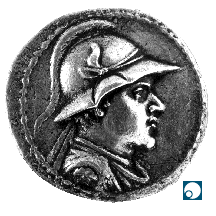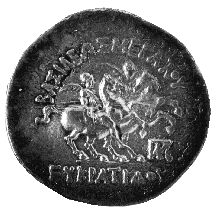



(53) Bactria, Eukratides - AR tetradrachm, after 170 B.C., 16.34
g. (inv. 91.095).
Obverse: Bust of Eukratides r., wearing cuirass,
diadem, and crested helmet with ear and horn of bull.
Reverse: Dioskouroi on horses rearing r.; monogram in r.
field; ![]()
![]()
![]() : of the Great King Eukratides.
: of the Great King Eukratides.
Provenance: Coin Galleries, 1961.
Bibliography: N. Davis and C.M. Kraay, The Hellenistic
Kingdoms: Portrait Coins and History (London 1973) 238-239.
Bactria was a partly Hellenized country bordering India that had been part
of Seleukid territory but that gained its independence c. 250 B.C. Eukratides
gained control of Bactria in 170 B.C. by raising a revolt against the Euthydemid
dynasty. He established himself as king of "the thousand cities of
Bactria" and set out to enlarge his kingdom in all directions. While
returning from one of his campaigns, he was killed by one of his sons, who
seized the throne.
The Bactrian coins are known for their strongly realistic portraits and
this tetradrachm of Eukratides is no exception. He is depicted as a formidable
warrior, wearing a cuirass and a bronze helmet over his diadem. The helmet
has the bull's ear and horn that appeared on the leopard-skin helmet of
Seleukos I (see no. 49) and that may have been meant
to allude to descent from the Seleukids. His features are individualized,
his expression stern. On the reverse, the Dioskouroi, Greek heroes noted
for their horsemanship and prowess in battle, are shown charging with spears
raised.
K.J.B.



All contents copyright (c) 1996.
Lawrence University
All rights reserved.